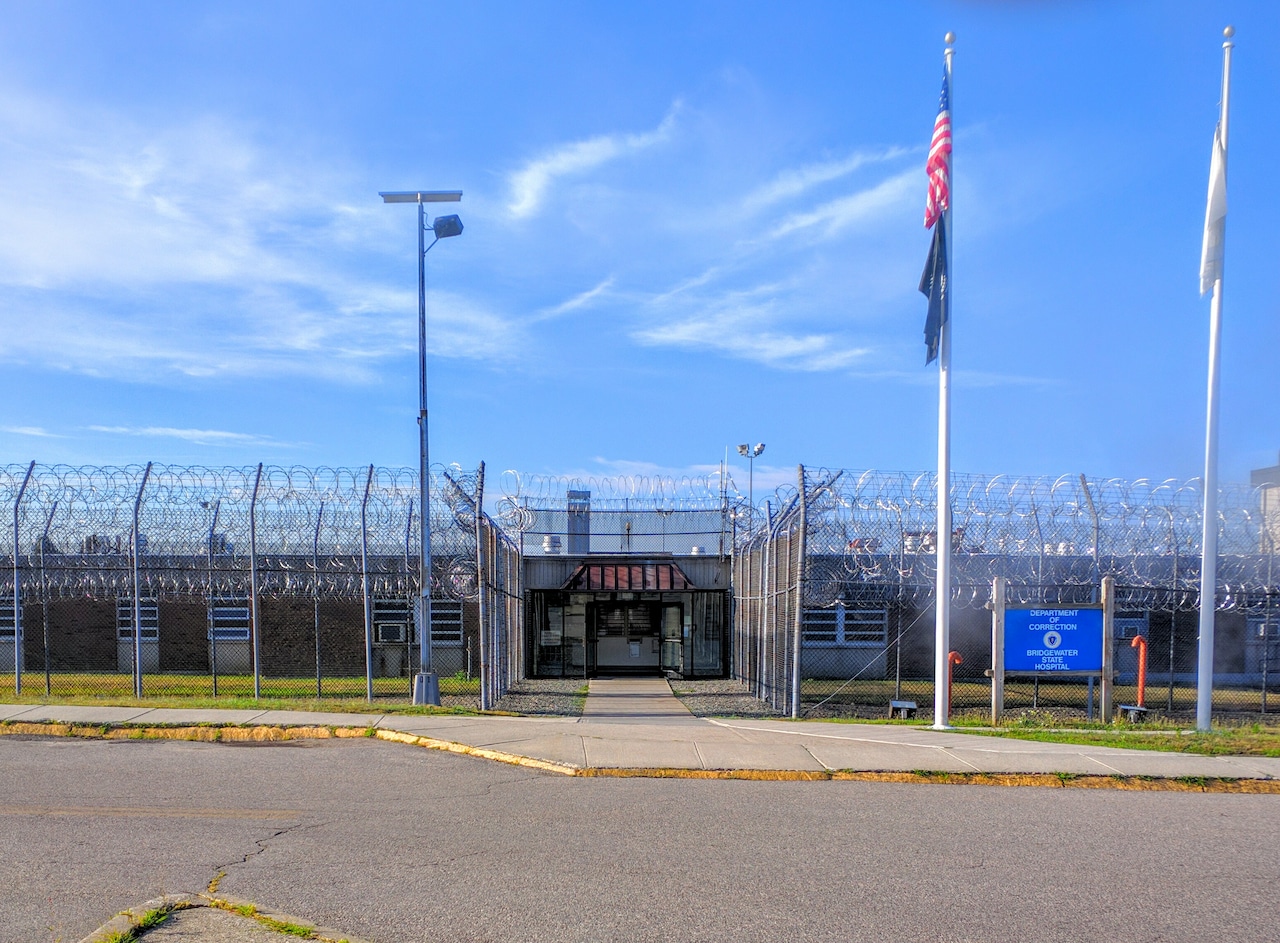
Conditions at Bridgewater State Hospital — a secure state psychiatric center that houses mentally-ill men accused or convicted of crimes — are so bad that the hospital should be shuttered, according to a new report from a watchdog organization.
The 46-page report from Disability Law Center — a Boston-based disability advocacy nonprofit — alleges a litany of eye-popping patient abuses at the hospital, including involuntary restraint through medication, physical violence from staff, negligent medical care and a building so moldy it is now unfit for patients or staff.
While the Department of Corrections has made some “significant improvements” at Bridgewater State Hospital in the last decade, its staff and aging facility still “unquestionably” fail to provide appropriate conditions and services for its patients, according to Disability Law Center.
“Efforts to patch BSH’s deteriorating physical plant and gradually change the troubling culture and practices within have not produced sustainable results. Ten years of scrupulous DLC involvement have shown that BSH is irreparably unsuitable to serve its population,” the nonprofit wrote.
To protect Bridgewater State Hospital’s patients and staff, the state must close the hospital and replace it with a “modern” facility controlled by the Department of Mental Health, which can ensure that patients receive appropriate treatments, Disability Law Center argued in the report.
On Monday, the Department of Corrections gave no indication that it plans to shutter Bridgewater State Hospital or give jurisdiction over it to the mental health department. Instead, the department and Tennessee-based healthcare company Wellpath — the hospital’s healthcare service provider — said in statements that they’ve improved conditions at the hospital.
Forced medication without permission
Disability Law Center’s report is based on monitoring it did at Bridgewater State Hospital from June to December 2023. One major issue identified by the nonprofit was the use of psychotropic medication to restrain patients without their consent or authorization from a court order.
Bridgewater State Hospital’s policies “explicitly sanctioned” medication restraint based on potential harm a patient might do to themselves or others, allowing hospital staff to use it even in the absence of an emergency, Disability Law Center found. Since Wellpath took over in 2018, use of physical restraints has gone down significantly, but “reliance on forced medication has become a mainstay,” the nonprofit wrote.
Medication restraint was used on Bridgewater State Hospital patients an average of 38.5 times a month during the six-month observation period, according to Disability Law Center. Additionally, Wellpath security staff often caused “violent, often dehumanizing” patient experiences by entering their rooms “dressed in riot gear, forcing them to the bed with a plexiglass shield, and holding them face-down to expose their buttocks for a nurse to administer intramuscular injections,” the non-profit wrote.
Disability Law Center reviewed footage 16 such incidents from the monitoring period. In one video, Wellpath staff dragged a “terrified and cowering” patient to a bed to forcibly inject the medication as he screamed and cried, according to the non-profit.
Medication restraint was also often administered long after an incident — as long as an hour following what may have been an emergency, Disability Law Center wrote. This calls into question the necessity of administering the restraint, the nonprofit argued.
Additionally, Disability Law Center found that staff were more likely to use involuntary medication restraint on Black patients. Despite making up only 21% of Bridgewater State Hospital’s patients, Black men made up 41% of patients who were subject to the forced injections during the monitoring period, the nonprofit wrote.
Dangerous mold leading to illness
Disability Law Center has publicly warned of dangerous mold at Bridgewater State Hospital — especially in its HVAC system — since 2018, and little has improved since then, according to the report. The nonprofit accused the hospital of ignoring its recommendations on how to address the mold problem and hiring an “unqualified company” to take care of it instead.
“HVAC systems observed during the inspection continued to be in deplorable condition, some with air handlers in wet and flooded basements with rampant mold growth and asbestos,” Disability Law Center wrote. “ … Even sections of HVAC systems that had been professionally cleaned were confirmed to be filthy and riddled with active mold growth after the cleaning.”
The type of mold found in Bridgewater State Hospital is known to cause health problems such as colds, chronic sinus infections and persistent coughing, which some patients — especially those with asthma — have experienced, according to Disability Law Center. The non-profit asserts that the hospital’s mold problem is so bad that the building should not be occupied until mold prevalence inside returns to safe levels.
Failure to treat opioid withdrawal
Bridgewater State Hospital has been providing inadequate treatment for many patient medical problems, but especially opioid use disorders, according to Disability Law Center. The nonprofit alleges that patients who were previously prescribed opioid use disorder medications often stop being prescribed them upon admission or have their dosages reduced due to healthcare providers’ discomfort with methadone treatment.
“BSH providers conflate mental health symptoms with withdrawal symptoms and, based on the stigma of both and lack of management of medication options, provide substandard care,” Disability Law Center wrote.
But these problems aren’t limited to substance use disorder treatments, according to the nonprofit. In the report, hospital staff are accused of ignoring repeated concerns from patients about their health, downplaying patients’ health issues and denying patients prescription medical devices.
All in all, from July to November 2023, 64 medical grievances were filed against Bridgewater State Hospital in reference to delays or denials of care, according to Disability Law Center.
Shocking patient stories of medical neglect
Disability Law Center provides many examples of disturbingly subpar medical care at Bridgewater State Hospital in its report. In one instance, a patient with “excruciating” cysts said he didn’t receive treatment for five months after being admitted to the hospital, and that when he finally did receive treatment, the hospital’s healthcare providers did not follow standard protocols, leading him to develop more cysts.
“At the same time, Wellpath staff were mistreating [the patient] as a result of his skin condition; he was suffering regular insults concerning the odor of the cysts and physical abuse from a now-terminated Wellpath staff member who sprayed him with industrial cleaning fluid,” the nonprofit wrote.
In another example, a patient said Bridgewater State Hospital staff injected him with an antipsychotic he had told them he was allergic to, and when he developed allergy symptoms, they treated the symptoms instead of finding a different medication, according to Disability Law Center. One patient even reported waiting a half hour for the hospital’s Director of Medicine to respond to his severe seizure, only to have them blame the seizure on his anxiety and prescribe him Benadryl.
Perhaps the most shocking example was that of a patient who needed additional leg surgery after being hit by a truck. Hospital staff didn’t get ahold of his medical records until two months after he was admitted and then failed to schedule a surgical consultation, according to the nonprofit.
The patient also had an autoimmune disease that carries an increased risk of infection and developed an infection shortly after admission. Though hospital staff repeatedly noted the infection in reports, they didn’t schedule a wound care or paint management appointment for him for four months, instead treating him only with bandage changes and over-the-counter pain meds, according to Disability Law Center.
Seclusion and lack of care
Bridgewater State Hospital patients are, in accordance with the hospital’s schedule, locked alone in their rooms for 11 hours a day, according to Disability Law Center. But in the hospital’s intake unit, their daily isolation period is usually much longer.
“DLC received numerous reports from [patients] that it was difficult to get staff to let them out of their cells for as little as 3 to 5 hours. This is inconceivable in a supposed psychiatric hospital setting,” the non-profit wrote.
Because Bridgewater State Hospital is under the Department of Corrections, it is given more leeway to seclude prisoners and does not have to report hours of seclusion like Department of Mental Health facilities do, according to Disability Law Center. Additionally, the nonprofit alleges that in hospital units located inside Old Colony Correctional Center in Bridgewater, some patients never receive any form of therapy or psychiatric care.
Some of these problems can be attributed to understaffing, according to Disability Law Center. In December 2023, correctional center units reported staffing rates as low as 65% for recovery treatment assistants, 50% for social services positions and 45% for nurses.
Patient stories of abuse
Old Colony Correctional Center officers are known to be overly forceful with patients, to the point of occasionally causing injuries, according to Disability Law Center. They’re also accused of “picking on” patients, and in one instance, an officer is alleged to have called a patient a “retard.”
“[Patients] frequently reported that unit [officers] are antagonistic, verbally abusive, and aggressive. While this is certainly not true of all [officers], [patients] reported that the [officers] who do behave appropriately do not intervene to stop concerning behavior by other [officers],” the nonprofit wrote.
But patients aren’t necessarily treated better at Bridgewater State Hospital proper, according to Disability Law Center. One patient in the intake unit reported being locked in his cell alone for an entire month and not being let out even to shower. He also said hospital staff denied him clothing for two weeks, leaving him naked until he ripped open a mattress to create makeshift coverings for “warmth and decency.”
Another patient told the nonprofit that he wanted to be admitted to the hospital so that he could receive mental health treatment for “concerning voices and visions.” Instead, he never met with a healthcare provider and was locked in his room for 21 to 22 hours a day, he said.
“He was mentally deteriorating being cooped up in his small cell without access to meaningful treatment or even a meeting with his treatment team,” Disability Law Center wrote.
The Department of Corrections’ response
The Department of Corrections has implemented many changes at Bridgewater State Hospital since the monitoring period ended, the department said in a statement Monday. These include increased tracking of restraint usage, daily reviews of recorded restraint instances and additional staff training on deescalation techniques to reduce the need for seclusion and restraint.
The corrections department has also hired a fourth mental health professional to oversee daily operations as a hospital administrator and a psychiatrist who previously worked for the Department of Mental Health to ensure the hospital’s policies are aligned with those of the mental health department. As a result of this review, hospital staff have submitted revisions for its seclusion, restraint and involuntary psychotropic medication policies, though it is unclear if the revisions are now in use.
“The Massachusetts Department of Correction, in coordination with our external medical provider, remains deeply committed to ensuring that patients with complex needs who require strict security hospitalization receive the highest quality of person-centered and trauma-informed care,” a department spokesperson wrote in a statement.
Even so, the Disability Law Center asserted in the report that the changes the department has implemented so far don’t address many of the nonprofit’s concerns, such as Bridgewater State Hospital’s mold and medical care issues.
“Massachusetts must cease involuntarily committing people with complex mental health needs and disabilities to a state prison facility where they will foreseeably face countertherapeutic conditions and suffer violations of their legal rights by those meant to provide them treatment,” the report reads.
Notably, the Department of Mental Health is willing to take control of the hospital — which houses 250 to 280 men — as Disability Law Center has recommended, according to The Boston Globe. There is also a bill currently going through the Massachusetts Legislature that would do just that.
Wellpath’s response
In a statement Monday, Wellpath, the company that currently oversees Bridgewater State Hospital, said it has “dramatically” reduced use of restraints and seclusion and improved patient care at Bridgewater State Hospital since it began servicing it. The healthcare company has also retained third-party accreditation of it services, it said.
“Wellpath always puts patients at the center of everything we do,” Wellpath said in a statement. “ … We value the important role the DLC plays and look forward to continued collaboration with them and the Massachusetts Department of Correction as we continue working to further improve services at Bridgewater.”
Notably, before Wellpath’s introduction in 2018, Bridgewater State Hospital faced lawsuits over the use of physical restraints and seclusion, according to The Boston Globe. Wellpath’s predecessor, Correct Care Recovery Solutions, successfully tamped down on these coercive control methods, the newspaper reported.
But in 2018, H.I.G. Capital acquired Correct Care Recovery Solutions and merged it with Correctional Medical Group, creating Wellpath, according to Nashville Business Journal. Since then, the healthcare company has had contracted with the Department of Corrections to service 14 state prisons, but federal officials identified problems with their care as early as 2020, the Globe reported.
So far, Wellpath has lost two of its contracts in Massachusetts, and its corrections department contract is up in June, according to the Globe. In recent weeks, politicians such as Elizabeth Warren and Ed Markey have expressed concerns about Wellpath, making its future in the state uncertain, the newspaper reported.






